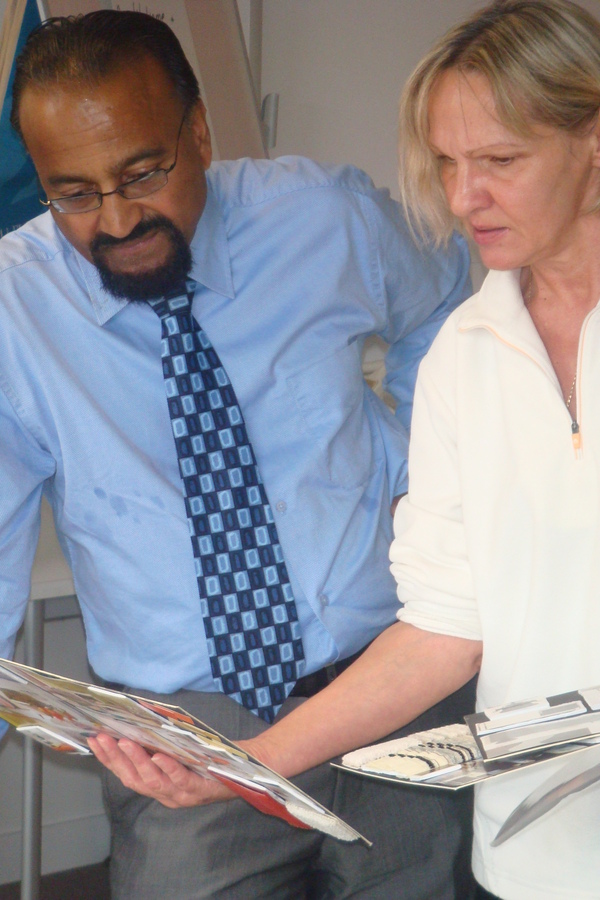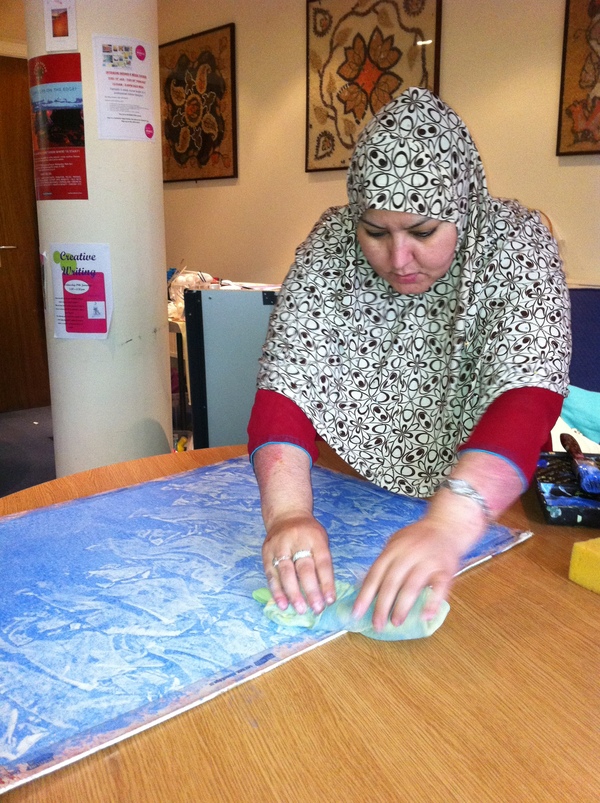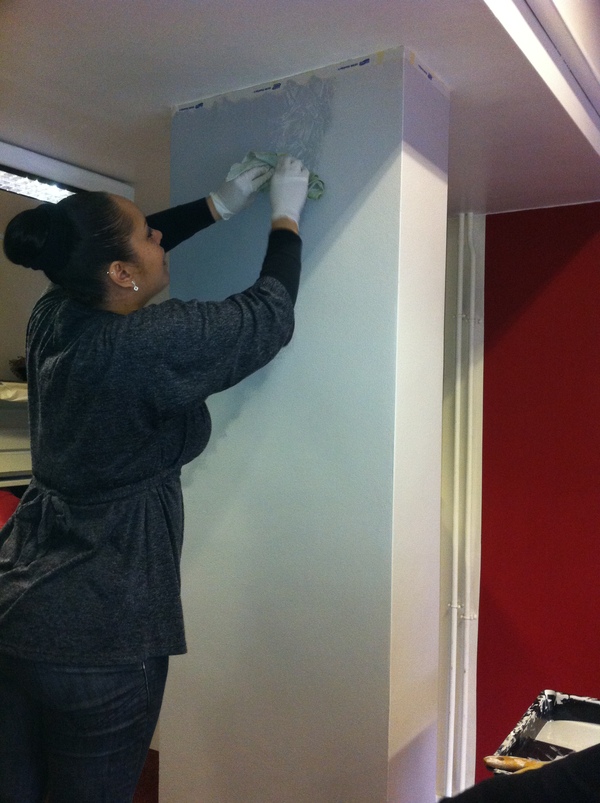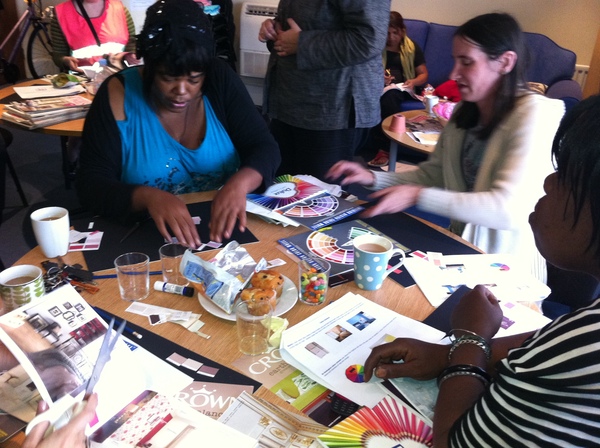
Happy Monday everyone! I hope you have all had a great weekend! For today’s post I thought I would feature a really inspirational story. At the moment we are inundated with doom and gloom and sometimes that can get us down a bit. But there are also some absolutely fabulous things going on out there, it’s just that we don’t often hear about them.
Well, not so long ago I heard about an amazing story on Twitter, when I was contacted by the lovely Elisicia Moore of Petit Miracle Interiors. Elisicia runs a registered charity organisation that uses interior design training to help increase the employability of people who are economically inactive, specifically vulnerable women, long-term unemployed and those who have experienced homelessness.
When I heard Elisicia’s inspirational story I couldn’t wait to have her on the blog. Now if you read my blog, odds on you love interior design and it has probably made a huge difference to your life in some way. But it probably doesn’t even come close to the extent that Petit Miracle Interiors is helping people to change their lives. Elisicia kindly agreed to answer some questions for us so we could find out more about the great work she is doing.

Can you tell us about Petit Miracle Interiors? What is it exactly?
EM. Well, I like to think we are pretty special because we believe that regardless of your socio-economic level, we all deserve to have beauty in our lives and a place to call home, not just bricks and mortar. We believe too, that meaningful employment and giving back to others is equally important to building confidence and having a quality of life.
Interior design is not a straightforward response to homelessness, we know that, and we also know that without a place to call home, obtaining work and building relationships is very difficult. We take this notion one-step further and offer people the chance to achieve accredited Interior Design training. Our aim is to increase the employability of people who have been economically inactive, specifically vulnerable women and those who have experienced homelessness.
So how does it work?
EM. Well, people enrol on our course, (work very hard) complete all of the course work necessary and for the last project students provide interior design advice to a newly housed, formerly homeless person. This approach to training enables our students to experience on-the-job training which cannot be taught in the classroom, before and after photos, which kick-start their portfolio and provides the newly housed person with a place to be proud of, one they have invested in; a home.
It’s a contemporary idea, using design to change lives. Interior design is an art, a fine art, and creative pursuits have long been hailed for their therapeutic benefits, we just added another layer; employability and tenancy sustainment.

Where did you get the idea for the company?
I worked at a great charity, called Thames Reach and had one of the best jobs in the world. I managed a programme that offered decorating training to homeless people. However, as with many programmes in the homeless sector, women were not engaging with the service. My background was interior design and I felt pretty sure that if we offered something that was of interest to women than they would attend, a no brainer really.
So, I started offering taster days in interior design and low and behold, the women started attending in droves! We were over the moon and I secretly was ecstatic as I much preferred interior design to decorating. At any rate, my time there ended as my work visa expired. I was very sad to say the least. But I had unwittingly created the perfect job for myself. The charity, after I left, did not continue with the training as I was the only person who could deliver it. A year later, Petit Miracle Interiors was born.
How do you go about finding the people who take part in your training courses? Do you work with any particular agencies?
EM. We are the only providers of Interior Design training to vulnerable people in London. We have been running workshops for a few years now and have built up a strong reputation. Often times, people seek us out as they want to try something different so we get a lot of self-referrals. Until we can secure funding, we only offer our courses to organisations rather than individuals, this way we can continue to provide the course free of charge to the learner.
We are an intermediary training provider for the Jobcentre and we work in partnership with Broadway Homelessness Support, Crisis and other community groups who either refer their clients to our courses or hire our services to deliver on site.

You said that one of the main problems that homeless people face with regards to training is that there are too few training centres that can offer qualifications to people with literacy problems or to women who may not be able to attend classes regularly. How does your training cater for people in those situations?
EM. We chose to accredit our courses through the National Open College Network (NOCN) because they specifically cater to people with literacy issues and they are completely flexible with the evidence of learning. For example, in a typical education institute you evidence learning through written assignments, however, with the NOCN you can evidence learning in many creative ways such as photos and video evidence.
No one would argue that because someone who does not have strong literacy skills is incapable of learning, it is only the way learning is evidenced that is arguable.
Interior design is quite a niche sector. How do the potential students know whether or not it is something that they would like to pursue?
EM. In our experience people who love design, specifically interior design, know from a very young age. A lack of opportunity or confidence is a common reason why people haven’t pursued design and this is why we are proud to offer training that is open access and flexible.
For those people who are still unsure whether interior design is for them, they can take our Taster Day class which is a 6 hour introduction to the basics in interior design, it offers people a bite-sized experience of our accredited learning.

Your company motto is “Changing Spaces – Changing Lives”. What difference does your training make to people who are long-term unemployed or who have experienced homelessness?
EM. It can make a difference in a number of ways:
A reduction in homelessness: By providing skills training and work experience through an open-access, accredited programme, we greatly enhance employment prospects. But we also help build confidence and self-esteem. The combination of these factors means less reliance on benefit support.
Reducing the cyclical nature of homelessness: A newly designed home will provide a stronghold for people to sustain their tenancies; pride in the home leads to a better quality of life and renewed relationships. Our programme reduces the likelihood of repeat homelessness by reducing two of the major contributors of cyclical homelessness:
- Social exclusion: Our group training is interactive, supportive, engaging and allows participants to help themselves as well as providing the opportunity to help others. The payoff of helping others is enormous, and offering interior design consultation also provides the building blocks for creating potential friendships.
- We remove the disadvantage participants feel, particularly those with low literacy skills through structured learning, skill development and employability.
Targeting long-term unemployed: Work experience gives students knowledge such as communication, negotiation, professional conduct, as well as building self-esteem and confidence. In the last cohort of Diplomas Graduates, 2 out of 9 students gained employment in design-related fields.
Inclusivity to minority groups and retaining a high rate of female participation: According to the government, there is a huge body of evidence about the disadvantage in the labour market in terms of higher unemployment rates and poorer access to employment that ethnic groups suffer. We have always tried to appeal to minority ethnic groups whilst paying particular attention to female participation.

What can your students expect to learn on the courses that you offer?
EM. We are currently revamping our courses and creating a new series of workshops. Our new qualification is a Level Two Certificate in Interior Design Skills from the NOCN. The courses on offer will be:
- Background to Interior Design
- Colour Theory and Design
- Drawing Plans and Elevations
- Furniture and Accessories
- Design Inspiration
- Lighting Products and Materials
- Understanding Scale and Spatial Drawing
- Wall, Floor and Window Treatments
In addition to the above accredited, Level Two, Certificate in Interior Design Skills we can also offer the Level One Paint Techniques Unit, a locally recognized qualification.

Do you offer advice and help to students who decide that they would like to take their training further once they have completed your courses?
Yes we do, for example, in partnership with Broadway Homelessness Support, we have developed a new project which ensures learners are supported every step in their training career, called Design Bank.
Design Bank will offer workshops in design, upcycling, and basic DIY. We’ll use the principles of regular banking, but with a twist: upcycled items of furniture and the time people put into the project are the currency. So when people sign up for workshops they learn the art of upcycling and also build credits towards their time-bank account. Time credits or cash can then be used to buy items from the project.
Once complete, Design Bank will signpost beneficiaries to a Level 2 Award in Interior Design Skills from the NOCN. Graduates will work with Petit Miracle Interiors designers and a recently housed Broadway client, with a £200 budget to redesign a room in their flat. Students’ design consultations help people put down roots, turn a house into a home and sustain their tenancy.
After the project completes, Broadway provides a 9-month mentoring programme for those people who are interested in obtaining employment. The mentor works with people to identify barriers and potential struggles and to establish solutions and a strategy to achieve and maintain employment. Learners are also supported to access The Employment Academy which helps clients to find work and stay in work.

A small amount can go a long way: £25 enables a student to access our Taster Day, introducing them to the world of interior design. £120 pays for one student to take an accredited course and start their journey towards a qualification. We have recently set up an on-line donation link on our website in hopes that if anyone is feeling generous it will be easy for them to part with their hard-earned cash.
Apart from money, how else can people support Petit Miracle Interiors and the work that you do?
EM. We are only limited by our imagination with this question. Recently we received support from Daniel Hill, The New Reclaimers TV presenter by sleeping rough with us on Christmas Eve, raising awareness to rough sleeping. He brought publicity and good company on a cold night!
We would really love an established, well-known interior designer/architect to become an ambassador for our charity, such as George Clarke or Kevin McCloud. Designers already know the importance of a well-designed space and the impact this has on our well-being.
To promote this concept on a public level would bring much-needed attention to our work and hopefully help us win future funding and grants. We love donations of any kind, specifically items that can be used in someone’s home or materials for the class, i.e. fabric, wallpaper, stationary, technical drawing supplies, etc.
Thank you so much Elisicia for telling us your fabulous and inspirational story. If anyone would like to make a donation to Petit Miracle Interiors to help transform the lives of those worse off through interior design please do so here. If you are able to donate supplies or equipment of the type mentioned above please contact Elisicia directly on elisicia@petitmiracles.org.uk. And to George Clarke and Kevin McCloud, Elisicia would really appreciate your support in this great cause.
